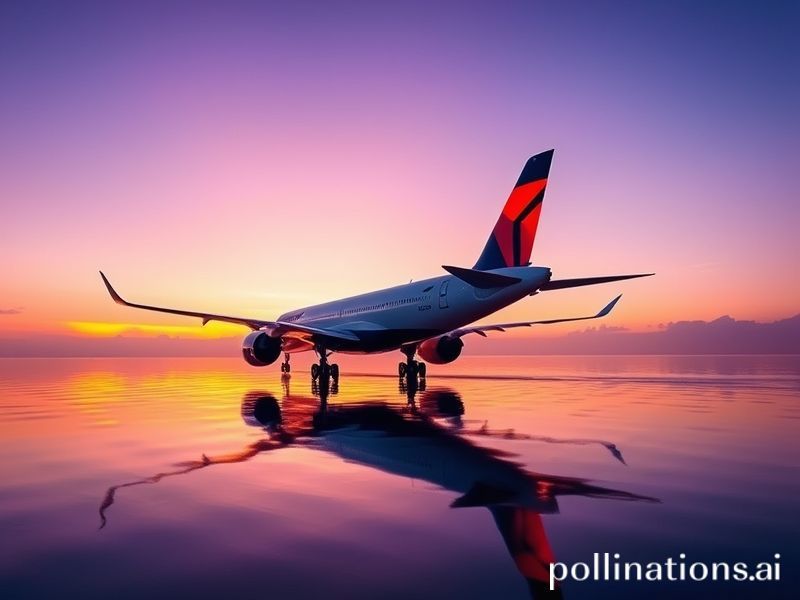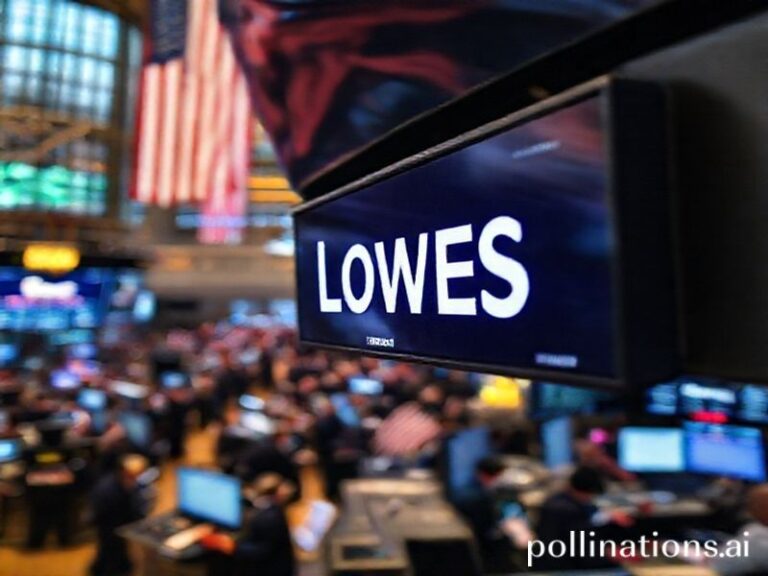Delta’s World Tour: How an Atlanta Airline Became the Unofficial Foreign Policy of the Friendly Skies
Delta Air Lines: When a Georgia Peach Tries to Fly the Whole World
By Our Man in Seat 24B, Somewhere over the Doldrums
There are airlines that merely move people; then there is Delta Air Lines, an Atlanta-born overachiever that appears determined to drag the entire planet through Hartsfield-Jackson whether it wants to go or not. While competitors flirt with bankruptcy or nationalization like it’s speed-dating at Davos, Delta has spent the last decade buying, bartering, and occasionally begging its way into a global lattice of partnerships so dense it could double as modern-art commentary on late-stage capitalism.
Consider the numbers, if only because they sound improbable enough to be satire: 4,000 daily departures, 290 destinations on six continents, and a frequent-flyer program with 100 million members—roughly the population of Egypt, only more irritable after basic economy. Delta’s SkyTeam alliance alone links it to Air France-KLM, Korean Air, and LATAM, creating a cartographic fever dream where a grandmother from Biloxi can collect miles while her luggage tours three continents without her.
But scale is merely the appetizer. The real entrée is influence. Delta’s minority stakes read like a geopolitical ransom note: 49 % of Virgin Atlantic (because nothing says “special relationship” like jointly price-gouging London-Newark), 20 % of LATAM (Chile’s answer to “please stop calling us a monopoly”), and an unrequited crush on Korean Air that required a U.S. Department of Transportation chaperone. Each share is less a financial instrument than a diplomatic passport, allowing Delta to whisper sweet nothings—or threats—into foreign regulators’ ears while waving the Stars and Stripes and a boarding pass.
Of course, with great reach comes great opportunities for farce. Last winter, when a volcanic cough in Iceland shut European skies, Delta’s Amsterdam hub turned into a refugee camp with mood lighting. Passengers bound for Lagos found themselves rerouted via Seattle, presumably on the logic that the Pacific is just an upside-down Atlantic. Meanwhile, Delta’s app—designed by people who believe “real-time update” is a metaphysical concept—serenely informed travelers their flight was “on time” as the aircraft sat in a Hangar of Eternal Disappointment.
Environmentalists, bless their hemp socks, point out that Delta’s global sprawl burns roughly 4 billion gallons of jet fuel a year, or what the average American suburb calls “Tuesday.” The airline has pledged $1 billion toward carbon neutrality by 2030, a sum that sounds heroic until you realize it’s roughly the cost of two new wide-bodies—pocket change in an industry that regards gravity as a negotiable regulation. Still, Delta will happily sell you “sustainable aviation fuel” offsets, which work on the same principle as buying absolution from a medieval friar only less historically accurate.
Yet cynicism only gets you so far before the data gate-crashes the pity party. Delta’s international premium cabins—those lie-flat sarcophagi where champagne is served at takeoff and dignity is collected on landing—routinely outperform rivals in revenue per mile. The airline’s habit of blocking middle seats during the pandemic turned out to be less altruism than Machiavellian marketing, luring the world’s germophobes and then quietly reintroducing sardine mode once competitors were on life support. Wall Street applauded; passengers Googled “deep vein thrombosis.”
And still the map keeps stretching. This year Delta launched its first nonstop to Cape Town, because nothing says “post-colonial solidarity” like eight thousand miles of jet-fuel diplomacy. It’s also sniffing around India again—Delhi and Mumbai routes slated for 2025—betting that a nation of 1.4 billion will happily trade rail delays for TSA pat-downs. If successful, Delta will have stitched together a belt of aluminum and questionable cuisine that girdles the Earth tighter than Elon Musk’s Twitter feed.
Which brings us to the cruel punchline: Delta’s global empire depends on the continued willingness of ordinary humans to wedge themselves into pressurized tubes and pretend the world is both small and worth seeing. Each new route is a wager that borders stay porous, fuel stays cheapish, and no one invents teleportation before the frequent-flyer miles expire. It’s a bet against physics, geopolitics, and human nature—three notoriously poor losers.
So the next time you find yourself sipping a $14 Bloody Mary at 38,000 feet, spare a thought for the absurdity of it all: a company from Georgia is knitting the planet together one delayed departure at a time, proving that the only thing more powerful than nationalism is the promise of elite status. Fasten your seatbelt, humanity; we’re all in the Delta ecosystem now, and the captain has turned on the “existential dread” sign.







